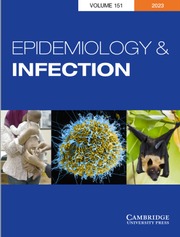Article contents
The relationship of two equine mycoplasmas to Mycoplasma mycoides
Published online by Cambridge University Press: 25 March 2010
Summary
Two unidentified mycoplasmas, N3 and N11, isolated from the respiratory tract of horses, were found to cross-react with strains of M. mycoides subsp. mycoides in indirect immunofluorescence tests, growth-inhibition tests carried out by the running drop/agar-well method, and in complement-fixation and double immunodiffusion tests. Serologically, the equine mycoplasmas were not completely identical with any of the reference strains of M. mycoides with which they were compared. Their cultural characteristics, ability to digest coagulated serum and casein, and survival at 45 °C, however, suggested that they were more closely related to strains of M. mycoides subsp. mycoides, such as Y-goat, which are found in goats, than to strains of that subspecies which are pathogenic for cattle.
- Type
- Research Article
- Information
- Copyright
- Copyright © Cambridge University Press 1981
References
- 2
- Cited by


